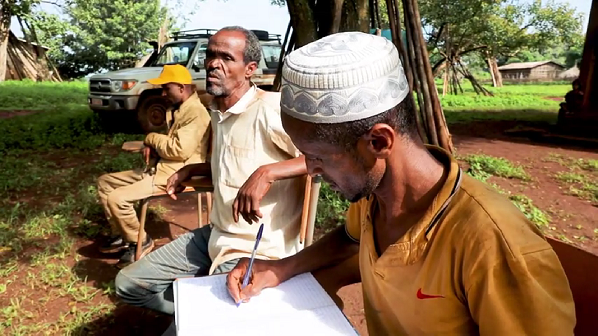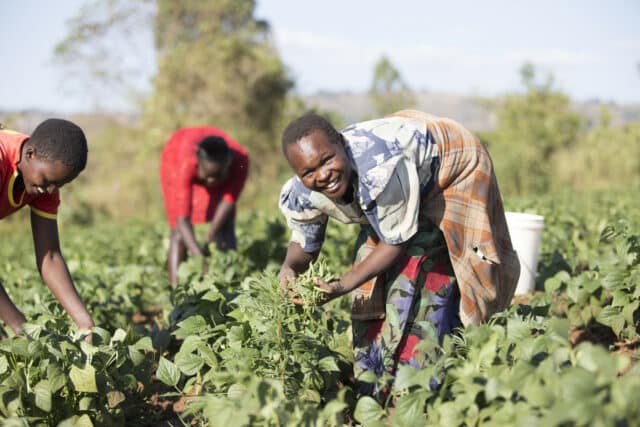Specific expertise
Protecting forests
Africa’s forests are an important global resource, serving as a vast carbon sink and repository for biodiversity and providing a vital source of freshwater, their rains feeding rivers.
Forests are also home to millions of people who depend upon the forests for their livelihood. However, many African forests are under serious threat.
Logging, fire, mining and oil exploration have caused widespread deforestation. Conflict, prolonged droughts and environmental degradation elsewhere are causing people to relocate to remaining forested areas in increasing numbers.
Many are clearing forest for livestock grazing, intensive coffee production or subsistence agriculture. Most rely on the forest for fuelwood and timber.
Farm Africa works collaboratively with forest communities, governments, and a wide range of other organisations to find innovative and sustainable ways of managing forests.
Sustainable livelihoods
Farm Africa develops economic incentives for communities to sustainably manage and protect forests. We help them replace traditional tree-cutting and wood and charcoal selling with forest-friendly businesses, like wild coffee harvesting, beekeeping and spice production.
Farm Africa has helped to develop new and valuable markets for these products. Business training is helping community groups formalise into cooperatives, develop business plans, obtain quality certifications and access markets.

Participatory forest management
We’ve been developing our approach to participatory forest management (PFM) for more than 20 years. It is a form of forest management that relies on formalised agreements between local communities and government. These agreements set out management responsibilities and arrangements for all people making a living from the forest, and ensure that its benefits are shared equally.
The hallmark of our PFM approach is a focus on giving local people an economic incentive to sustainably manage and protect forests. In return for protecting precious biodiversity, communities are allowed to extract resources from the forest in a sustainable way.
Sustainable fuel and timber solutions
Firewood collection and tree felling for timber are major drivers of deforestation. Farm Africa supports communities to find more sustainable ways to meet their fuel and timber needs.
We’re working with farmers to trial biogas as an alternative fuel source, converting animal manure to provide fuel that provides a cleaner, more efficient way of cooking and can power lights too.
We help communities to produce and sell fuel-efficient cooking stoves that can reduce household firewood consumption by as much as 50%. The stoves also free up time spent collecting firewood for other activities, and improve families’ health by reducing their exposure to smoke.
We also encourage people to plant wood lots on their farmland. By densely planting fast-growing tree species near to their home, people become less reliant on the forest for fuelwood. They can also realise a financial return by selling the matured trees for timber or fuel.
Sustainable agriculture
Dwindling harvests are a major driver of deforestation, with farmers clearing forest to access fertile soil. We help ease the pressure by offering training in climate-smart agriculture, which increases crop productivity on existing plots while maintaining soil fertility.
With prolonged droughts and increased livestock numbers, reliance on open grazing has become unsustainable. To ease grazing encroachment into the forest, we work with communities to develop rangeland management solutions and provide training in animal fodder production.
Agroforestry
Trees play an important role in erosion and flood protection, drought resilience and soil fertility. Across our projects, training in agroforestry is helping farmers appreciate these ecosystem services, and also the economic value trees can provide by producing fruit, fuelwood, timber and coffee. This is leading to increased planting of trees alongside crops or on cleared farmland.
Carbon credits
Training in biodiversity monitoring is helping communities quantify the ecosystem services their forest stewardship or tree planting is providing, enabling them to benefit from schemes such as carbon credits.
Over 154,000 smallholder farmers in Embu and Tharaka-Nithi counties in Kenya are now able to earn additional income by planting and growing certain trees on their farms, as part of Farm Africa’s regenerative agriculture project funded by AGRA.
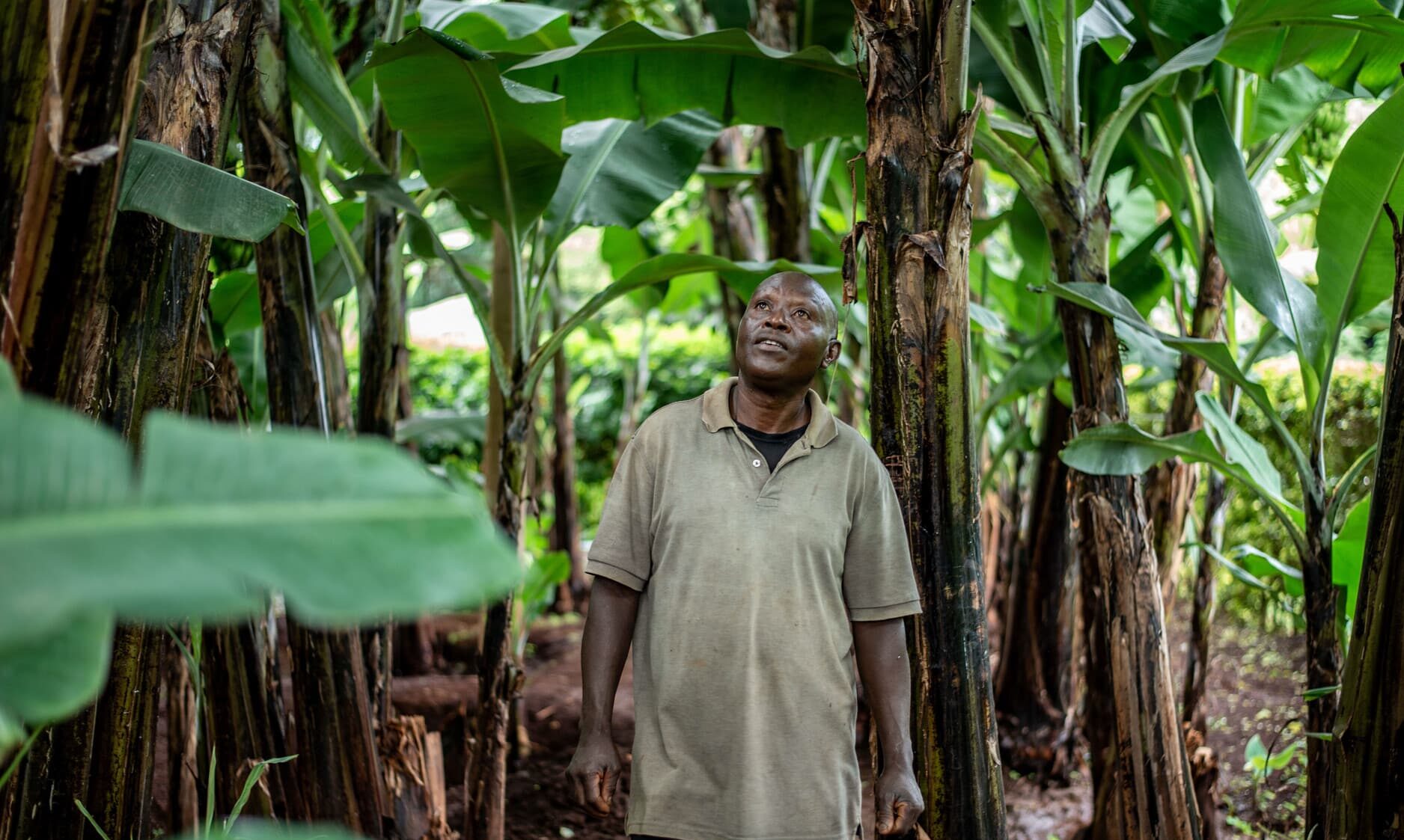
Tailored support
Although forest communities face many similar challenges, each also faces challenges unique to its locality.
We work in close partnership with local communities to design and deliver highly bespoke programmes which bring life-changing impact.

In Ethiopia’s Bale Eco-region, we supported communities to reduce deforestation by 58% between 2012 and 2020, compared to the projected rate of deforestation in the absence of the project. This resulted in over 25,000 hectares of forest being saved and emissions being reduced by 10.5 million tonnes of CO2e.
Resources
Country
Ethiopia
Key focus areas
Increase incomes
Protect ecosystems
Making forests sustainable
Between 2012 and 2021, Farm Africa worked with the NGO SOS Sahel Ethiopia, with funding from the Royal Norwegian Embassy in Ethiopia, to deliver a REDD+ project that lowers greenhouse gas emissions by reducing deforestation in the Bale Eco-region, while also boosting the livelihoods of local communities living in poverty. This document presents key lessons generated by the Phase II of the project, which ran from 2016 to 2021.
Download (23.63mb)
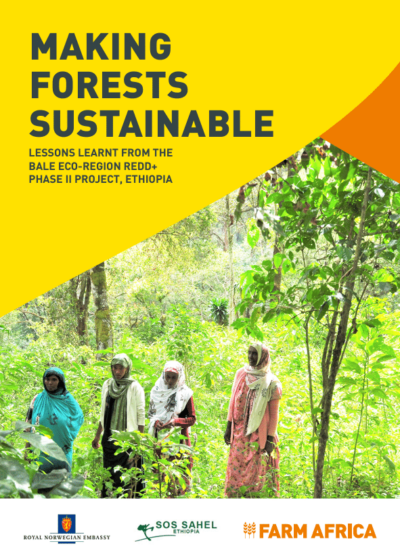
Country
Ethiopia
Key focus areas
Increase incomes
Protect ecosystems
Country
Ethiopia
Key focus areas
Act on climate change
Increase incomes
Protect ecosystems
Forests for sustainable development factsheet
Factsheet on Forests for sustainable development programme, which aims to contribute to the sustainable conservation of natural forests, biodiversity and ecosystem services in the Bale Eco-region and associated landscapes in Guji and Borena zones in Oromia, Ethiopia through interventions that reduce deforestation and biodiversity loss, increase household incomes and resilience of the local community, and improve governance for integrated landscape management.
Download (673.28kb)

Country
Ethiopia
Key focus areas
Act on climate change
Increase incomes
Protect ecosystems
Country
Ethiopia
Key focus areas
Boost productivity
Increase incomes
Protect ecosystems
A greener future on a grand scale: a summary of the Bale Eco-region Phase II project
Ethiopia’s Bale Eco-region is an ecologically critical area and also home to many people who depend on its resources for their livelihood. Since 2014, Farm Africa has been leading a consortium to improve livelihoods in the region while ensuring the ecosystem is protected. The first phase of the project developed a management strategy for the region. Phase II (2019-2024), funded by the European Union, has scaled out the strategy to reach over 1.6 million people. This report summarises those Phase II activities and outcomes.
Download (3.96mb)
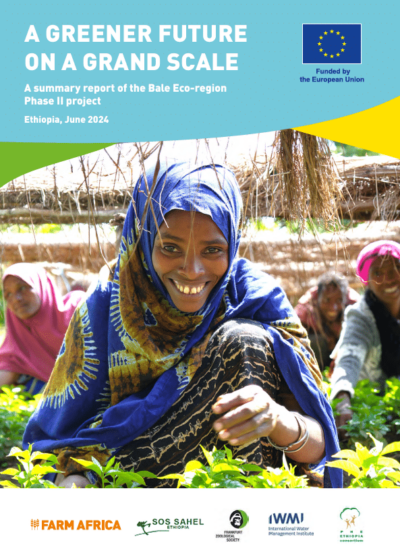
Country
Ethiopia
Key focus areas
Boost productivity
Increase incomes
Protect ecosystems
Country
Ethiopia
Key focus areas
Boost productivity
Increase incomes
Protect ecosystems
Producing and marketing forest products: success stories
Poverty drives deforestation in Ethiopia’s Benishangul Gumuz Region. Farm Africa is supporting forest users to sustainably profit from forests’ resources. This publication presents stories that look at how people and forests can thrive together.
Download (1.69mb)
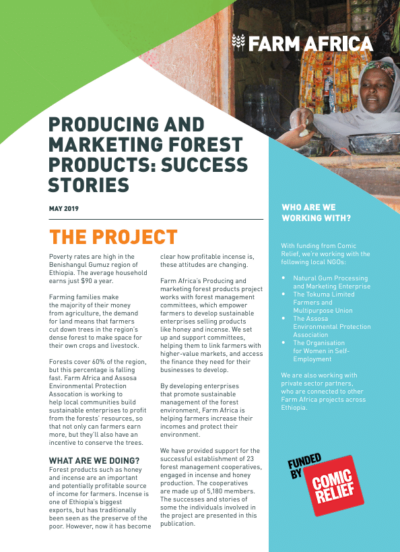
Country
Ethiopia
Key focus areas
Boost productivity
Increase incomes
Protect ecosystems
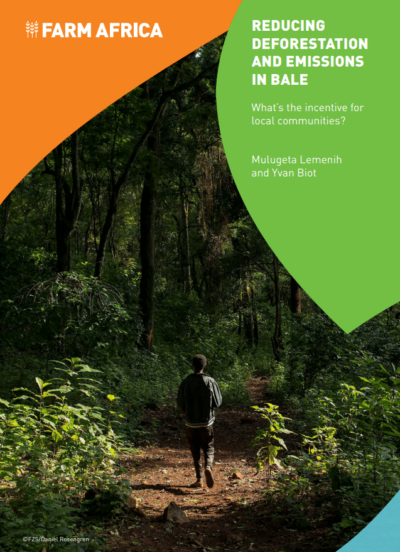
Reducing deforestation and emissions in Bale – What’s the incentive for local communities?
More info
Country
Ethiopia
Key focus areas
Increase food security and nutrition
Increase incomes
Protect ecosystems
Reducing deforestation and emissions in Bale – What’s the incentive for local communities?
This report presents evidence of how 12,496 hectares of forest in the Bale Eco-region were saved between 2012 and 2015 following the establishment of a REDD+ initiative. The reduced deforestation stopped 5.5 million tonnes of carbon dioxide from being released into the atmosphere.
Download (3.02mb)

Country
Ethiopia
Key focus areas
Increase food security and nutrition
Increase incomes
Protect ecosystems







